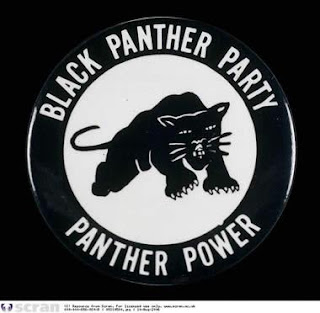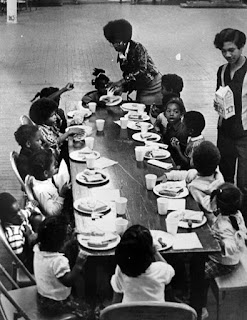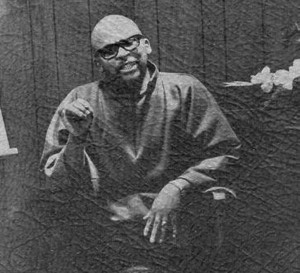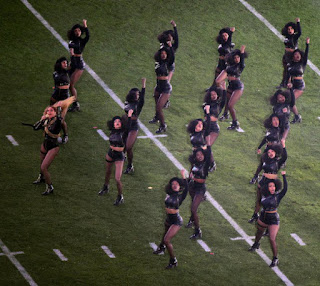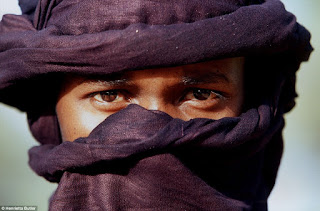Female Black Panther Party, Sexism in the Group?
NB COMMENTARY: I really wanted to NOT be in this Beyoncé Madness, but the irony of it all is to see folks being offended by her antics to the point of calling it racist when in fact, if they took the time to read the lyrics, they would see the song is all about Beyoncé getting hers. With a smattering of some retorts against "whatever." The fact that she even uses this "so-called" Black Panther imagery, which in and of itself is a smack in the face of the movement, a downgrade at best in its presentation and surely not militant at all; is amazing to me. The fact that folks are getting hot under the collar over it is outright laughable. Then, on the other hand, you have these drones who support and even consider this "show" as something meaningful or even intrinsically an acknowledgment of her "Blackness." Now I am ROFLMAO and sadly, there are many in that camp as well.
In it's simplicity
it barely shows any aggression or hatred or anything against the police. It's
a bunch of scantly clad women, fist balled up, dancing with Beyoncé in
formation. The directive?? Work hard, grind hard, own it so you can "have
the paper." Which none of that was what the BPP Movement was about but
surely a capitalistic approach to success.
These folks give
money to these movements (Black Lives Matter which is suspect on its face), and bail protesters out of jail, but none of them
will give up their way of life to join the Movement on the Real, and that's
the point. If twirling her ass, and rocking her crotch gets her money, that is
what she will do, she certainly is not on the front lines of the conscious
movement or on the front lines of the progressive movement.
Being part of the conscious or progressive movement would be
detrimental to her power bank account cause folks would stop spending money on
those things that do nothing for their progress and that would mean to stop buying her
and her husbands stuff. Her lyrics were more about, "this is what you get for
your money, I work hard for it, I slay for it, and see, what your money did
for me??? I am at the Super Bowl."
It's all about her
and will always be about her, and folks need to get real cause she ain't doing
nothing against her handlers who are all "albinos." LOL Check out
the lyrics if you haven't already. Click
Here for the Lyrics
SOURCE: http://blackpantheressproject.tumblr.com/
Although
the Black Panther Party (BPP) revolutionized the condition of Black people and
communities in the 1960s, sexism in the group silenced the voices of Black
women to promote a Black nationalist agenda that became conflated with the
idea of preserving Black masculinity. This project aims to examine how and why
this brand of racialized sexism in the Black Panther Party operated in the
group, and to shed light on some of the silenced and erased the narratives
about radical Black womanhood.
Regina
Jennings, a Black woman who joined the Black Panther Party as a teenager,
reflects about her experience with sexism in the group. She recounts a
particularly difficult encounter with a captain who romantically pursued her.
When she rejected his advances, she explains, “he made my life miserable. He
gave me ridiculous orders. He shunned me. He found fault in my performance”
(262). Ultimately, he had her transferred to a different branch of the
organization, even though that meant completely disrupting her way of life.
Jennings brought the incidences to the Central Committee’s attention, but the
all-male panel accused her of white, bourgeois behaviors and values.
In
spite of this situation, Jennings takes great pains not to demonize the entire
group. While she and other women in the Black Panther Party confronted this
form of sexism and misogyny, they also received a lot of support from Black
men. Some Black men even defended Jennings when she complained of the sexual
harassment, even when that meant that other men would shame them or call them
emasculated. Jennings attributes these circumstances with a lack of knowledge
or experience with power. “Black men, who had been too long without some form
of power, lacked the background to understand and rework their double standard
toward the female cadre” (263), she contends, demonstrating that oppression
not only works to degrade a group, but also impels that group to internalize a
set of power structures and enact oppression upon others. In spite of her
claims, she emphasizes that this type of sexism should not be excused but
rather understood. Jennings celebrates the love present in the BPP, forgiving
the Party for the conditions that made it imperfect while honoring the uplift
it achieved.
“I want you to know how much they perfectly loved you,” she clarifies in reference to those who dedicated their energies to Black communities. “I want you to know that they were willing to die for you” (264).
December
18, 2013
Kathleen Cleaver on Black Natural Hair
Kathleen
Cleaver was the first female member of the Black Panther Party’s decision
making body. In this interview, Cleaver challenges Euro-centric standards of
beauty while expressing the BPP’s stance on self-love, and Black revival
through celebrating different images of Blackness. She really does make a case
for “the personal is political”!
Although
Black women have not always identified with labels such as “feminist,” Black
women have advocated for women’s issues as early as the 19th century.
Black women have fought for economic justice/equality, against racism, against
sexism, and against imperialism throughout U.S. history. In fact, the first
wave white feminists learned much of their organizing and political strategies
from Black, female abolitionists.
The
late 1960s and the 1970s did witness an increasing number of Black women
articulating their experience around the words “feminist” or “feminism,” but
also a number of Black women challenging the structure of feminist movements.
The Women’s Liberation Movement (WLM) took the nation by storm, voicing many
women’s grievances, but it did not appeal to many Black women and women of
color who interpreted the movement’s work as an agenda that principally
furthered white, upper-class women’s issues. Furthermore, many Black women
considered their involvement in mixed gender spaces more pressing because they
identified more with their male counterparts’ struggles than with the affluent
white women’s problems. Kathleen Cleaver explained this phenomenon:
“The problems of Black women and the problems of White women are so completely diverse they cannot possibly be solved in the same type of organization nor met by the same type of activity… [but] I can understand how a White woman cannot relate to a White man.”
This
racial solidarity in some ways led some Black women in mixed gender groups to
tolerate oppressive ideologies to avoid division, or to subscribe to certain
roles. In the pamphlet, “Panther Sisters on Women’s Liberation,” some women
insisted that “Black men understand that their manhood is not dependent on
keeping Black women subordinate to them,” but also claimed that because “our
men have been sort of castrated,” women had to avoid taking up too much space
in leadership so that Black men would not have any “fear of women dominating
the whole political scene”. That kind of admonition to other Black women
invokes ideas about pathologized matriarchy. Other women in the BPP adopted
more masculine roles in order to be taken more seriously. Assata Shakur
confessed, “You had to develop this whole arrogant kind of macho style in
order to be heard… We were just involved in those day to day battles for
respect in the Black Panther Party,” revealing the complications in
negotiating one’s gender identity and the implications of said gender, even in
anti-oppression organizations.
Although
the climate of the BPP proved difficult to articulate in terms of gender
politics, it was due to Black women’s participation in mixed gender groups and
organizations (as opposed to the tendencies of some white, radical feminist
groups who championed separatism), that Black women could interrogate the
sexist and misogynistic ideologies present in anti-oppression organizations.
Various BPP chapters even collaborated with the Women’s Liberation Movement at
times, such as in 1969 when WLM members protested the cruel treatment of
imprisoned Panther women.
Black
women’s presence in the BPP forced men to reconsider their sexist assumptions.
Even Party leaders like Eldridge Cleaver shifted positions. In 1968, Cleaver
limited Black women’s political potential only to “pussy power,” or, the idea
that Black women should withhold sex from Black men until he was ready to
“pick up a gun” and embrace his own activism. In contrast, a year later,
responding the cruel treatment of Black Panther women in prisons, Cleaver
asserted that “if we want to go around and call ourselves a vanguard
organization, then we’ve got to be… the vanguard also in the area of women’s
liberation, and set an example in that area.” Black women demonstrated that
sexist gender norms could not dictate their worth, and that in the grand
scheme of things, the police imprisoned them just as they imprisoned Black
men, and that white society had stripped them of their femininity just as it
had stripped Black men of their masculinity.
Sources:
Anon.
“Panther Sisters on Women’s Liberation.” In Heath, ed. Off the Pigs! Pg. 339.
Cleaver,
Eldridge. “Message to Sister Erica Hugggins of the Black Panther Party.”The Black Panther Party. 5 July 1969.
Reprinted in Foner, The Black Panthers
Speak. 98-99.
Cleaver,
Eldridge. “Speech to the Nebraska Peace and Freedom Party Convention,” 24
August 1968. Pg. 22
Matthews,
Tracye. “No One Ever Asks, What a Man’s Place in the Revolution Is”: Gender
and the Politics of The Black Panther Party 1966-1971.” In: The Black Panther Party [Reconsidered].
Edited by Charles E. Jones. Black Classic Press, Baltimore, 1998. Pg. 274,
284, 290.
December
18, 2013
In
1965, then Assistant Secretary of the US Department of Labor, Daniel Patrick
Moynihan, issued a report about the question of poverty and the Black American
population. Startled by statistics that showed that the unemployment rate of
Black people doubled that of white people, Moynihan set out to expose the
conditions that economically limited African Americans.
Given
its historical context, the Moynihan Report actually represented a radical
conceptualization of the relationship between gender identities, family
structure, and socio-economic class; however, Moynihan’s statement falls short
of the mark by pointing to Black matriarchy as the damning factor. While
recognizing that structural conditions that originate in the enslaving of
Black people in America has contributed to and caused many of the social
disadvantages that plague African American communities contemporarily,
Moynihan implicates Black motherhood thereby suggesting that without a
patriarchal structure, the Black family is doomed to fail. “He does… identify
the fundamental problem confronting the Black community as the ‘tangle of
pathology’ associated with a matriarchal family structure,” contest Juan J.
Battle and Michael D. Bennet in “African-American Families and Public
Policies.” By legitimizing Western, patriarchal culture over non-white
alternatives to the family structure, Moynihan prioritizes the suggestion that
the Black family is deviant and therefore pathologically damaged instead of
demonstrating how institutions like racism, sexism and classism systematically
oppress Black families. In this way, he roots the problem in a presumed cultural
deficiency, shifting the onus to Black mothers to stop corrupting the family
structure instead of on the government to stop discriminating against people
of color.
African
Americans had initiated conversations about the Black family long before the
Moynihan Report; nevertheless, using anecdotal, historical, sociological, and
statistical evidence, the Report validated many Black men’s sentiments of
“castration” and their resentments about a lost masculinity. Without a doubt,
some Black men within the Black Panther Party endorsed the Moynihan Report to
sanction their own desires for male superiority. Even Black Panther Party
co-founder Huey Newton attested to this male inferiority complex:
“[The Black man] feels that he is something less than a man… Often his wife (who is able to secure a job as a man, cleaning for White people) is the breadwinner. He is therefore, viewed as quiet worthless by his wife and children” (Huey Newton, To Die for the People. Pg. 81)”
Interestingly
enough, although Newton does not necessarily subscribe to the subordination of
Black women to elevate the Black man, he does not attempt here to undermine
the assumption that men should be
the breadwinner, that womenshould not head
the Black family, or that the solution is to esteem the Black man above the
Black woman. Women, especially those in the BPP, would have to create most of
the awareness about the fallibility of this form of social change.
Sources:
Battle,
Juan J. and Bennet, Michael D. “African-American Families and Public Policy:
The Legacy of the Moynihan Report.” Sage Publications, London and New Delhi,
1997. Pg. 154
Moynihan,
Daniel P. “The Negro Family: The Case for National Action.” 1965
Newton,
H. To Die for the People: The Writings of
Huey P. Newton. City Lights Publishers, 2009. Pg. 81
December 18, 2013
In the
1960s, Maulana Karenga spearheaded Us, a Los Angeles-based organization
dedicated to raising Black people’s awareness of their cultural heritage. Us
propounded the notion that a revival of African traditions would elevate the
condition of African Americans. Whether real or contrived, these traditions
would ennoble Black people in new ways.
[Malauna
Karenga, founder of “Us,” creator of the pan-African/African American Holiday
of Kwanzaa, intellectual and writer.]
The
Black Panther Party and Us supported each other ideologically, and Maulana
Karenga even attended various BPP meetings and rallies. In spite of this
initial alliance, the two groups diverged when their ethics no longer aligned.
The BPP pushed back against Us’ idea that all Black people were allies in the
struggle simply because of the color of their skin. On January 17, 1969, a
shootout erupted between BPP and Us members during a Black Student Union
meeting at UCLA, which resulted in the death of two BPP members. From that
point onward, the relationship between the two organizations never
recovered.
Although
the Black Panther Party and Us often feuded, the earliest philosophies in the
Black Panther Party do reflect many of Karenga’s beliefs. With respect to
women, Karenga championed female submission in the name of reinstating Black
male authority. He observed:
“What makes a woman appealing is femininity and she can’t be feminine without being submissive. A man has to be a leader and he has to be a man who bases his leadership on knowledge, wisdom, and understanding… The role of the woman is to inspire her man, educate their children and participate in social development. We say male supremacy is based on three things: tradition, acceptance, and reason. Equality is false; it’s the devil’s concept.”
Karenga
espoused a complimentary gender theory; this theory depends on the credence
that Black women serve to affirm Black men’s superiority. The foundation for
this brand of Black racial uplift remains in the notion that empowering Black
men necessarily will translate to empower Black communities. Ironically, this
philosophy does not interrogate the premise that the restoration of Black male
supremacy only occurs insomuch as Black women inspire and educate these
Black men. Unfortunately, many of these problematic viewpoints continued to
circulate in BPP chapters after Karenga’s departure from the group,
necessitating that the Party resolve many of its gendered issues in later
years.
Sources:
Halisi,
Clyde, ed., The Quotable Karenga.
Los Angeles: Us Organization, 1967. Pgs. 27-28
Matthews,
Tracye. “No One Ever Asks, What a Man’s Place in the Revolution Is”: Gender
and the Politics of The Black Panther Party 1966-1971.” In: The Black Panther Party [Reconsidered].
Edited by Charles E. Jones. Black Classic Press, Baltimore, 1998. Pg. 272
December 18, 2013
How is
it that an organization so committed to righting the wrongs committed against
Black people, could often support
ideologies that endorsed the subordination of women? It is important to
recognize that the Black Panther Party (BPP) did not exist in isolation;
competing concepts about gender and sexuality perpetuated and upheld in
mainstream society shaped the social frameworks of BPP members. The process of
dismantling sexism meant theoretical and practical work on the part of all Party members. One female Black
Panther who worked in the Oakland and international chapters, the late Connie
Matthews assessed the disparity between the BPP’s philosophies and practices.
“I mean, it’s one thing to get up and talk about ideologically you believe this. But you’re asking people to change attitudes and lifestyles overnight, which is not just possible. So I would say tht there was a lot of struggle and there was a lot of male chauvinism… But I would say all in all, in terms of equality… that women had very, very strong leadership roles and were respected as such. It didn’t mean it came automatically.” (Interview with Tracye Matthews, 26 June 1991; Kingston, Jamaica.)
The men and the women in the Black Panther Party had
internalized various views that validated sexism and even a racialized form of
sexism. This brand of misogyny that specifically targeted Black women
(contemporarily referred to as misogynoir) manifested itself in public
discourse in two important ways: throughcultural
nationalism, and through the Moynihan
Report. True equality in the Black Panther Party
meant interrogating these cultural “norms” and exchanging those views for a
more egalitarian framework.
Source:
Matthews, Tracye. “No One Ever Asks, What a Man’s Place in the Revolution Is”:
Gender and the Politics of The Black Panther Party 1966-1971.” In:The Black Panther Party [Reconsidered].
Edited by Charles E. Jones. Black Classic Press, Baltimore, 1998. Pg. 289
December 18, 2013
1969, the Free Breakfast
for School Children Program was initiated at St. Augustine’s
Church in Oakland by the Black Panther
Party. The Panthers would cook and serve food to the poor inner city
youth of the area.
Male
figures in the Black Panther Party, such as Bobby Seale, Huey Newton, and
David Hilliard, were key to the initiation process of this project; however,
Black women figured greatly in the execution of
the first Breakfast Programs. Neighborhood mothers, who lived close to St.
Augustine’s Church and actively participated in local parent-teacher
associations, focused their energies on the program, even though they were
often unaffiliated with the BPP, and made it a success. Female members of the
Black Panther Party also contributed to the Free Breakfast Program by feeding
as well as educating the children present. Although tensions often arose
between the more conservative community mothers — who preferred that the
children quietly and orderly ate — and the Black Panther women — who brought
their restless, activist spirits into the spaces — these women cooperated to
transform their neighborhoods.
Ms.
Ruth Beckford, a parishioner at St. Augustine’s Church who helped to establish
the Free Breakfast program with Bobby Seale and head of the Church, Father
Earl Neal, spoke of the communal uplift that occurred through nourishing the
community’s children. “When we were doing it the school principal came down
and told us how different the children were. They weren’t falling asleep in
class, they weren’t crying with stomach cramps, how alert they were and it was
wonderful” (412), Beckford insists in an interview, demonstrating that by
feeding the young children, the predominantly female Black Panther Party and
Black community members radicalized their youth’s relation to education
systems and thus their youth’s access to societal opportunities. The Free
Breakfast Program, a largely woman-run project, asserted Black people’s right
to food, to preparations so that they could thrive academically, and to
conditions to further their position in society.
Source:
Heynen, Nik. “Bending the Bars of Empire from Every Ghetto for Survival: The
Black Panther Party’s Radical Antihunger Politics of Social Reproduction and
Scale.” Department of Geography, University of Georgia, published online: May
2009.
December
17, 2013
Women of the Black Panther Party demonstrating in front of
Alameda County Courthouse Oakland, CA
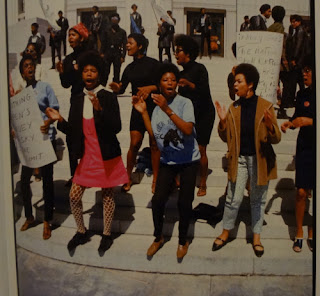 |
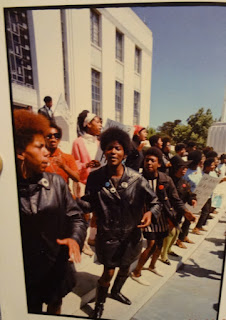 |
Taken from “Black Panthers: 1968” by Howard L. Bingham
December 17, 2013
“[W]omen ran the BPP pretty much. I don’t now how it got to be a male’s party or thought of as being a male’s party. Because those things, when you really look at it in terms of society, those things are looked on as being woman things, you know, feeding children, taking care of the sick and uh, so. Yeah, we did that. We actually ran the BPP’s programs.” (Frankye Malika Adams in an interview with Tracye Matthews, 29 September 1994; Harlem, New York)
When
the media invokes images of the Black Panther Party (BPP), it often displays
images of gun-toting Black men in military garb. Historical representations
have relegated many women who participated in and devoted their energies to
the Black Panther Party to a prop status. Excluding the outliers like Assata
Shakur and Kathleen Cleaver, women in the Black Panther Party earn their time
in the spotlight insomuch as they endorse the male cause; even some of the
more famous images of these Black women feature them holding up signs for the
Free Huey Campaign. Despite these depictions, Black women played a fundamental
role in the Black Panther Party. Often comprising the majority of local BPP
groups, women staffed and coordinated free breakfast programs, liberation
schools, and medical clinics. The Party even sought out Black women
unaffiliated with the organization, such as women on welfare, grandmothers and
community figures, to staff these initiatives. If these women played such a
fundamental role in the infrastructure of the BPP, why aren’t Black women as
celebrated for their contributions? History has a way of degrading work that
mirrors “traditional” female duties to categories like “community service” or
“support work”. The term “support work,” especially invokes the connotation of
inferior, menial and subordinate labor. Sexism not only impacted what jobs
Black women in the BPP received or fulfilled but also how history conveys the
value of said efforts.
Source:
Matthews, Tracye. “No One Ever Asks, What a Man’s Place in the Revolution Is”:
Gender and the Politics of The Black Panther Party 1966-1971.” In:The Black Panther Party [Reconsidered].
Edited by Charles E. Jones. Black Classic Press, Baltimore, 1998.
December
17, 2013
“Black
liberation politics became equated with black men’s attempts to regain their
manhood at the expense of black women,” asserts Anita Simmons in the chapter
“Black Womanhood, Misogyny and Hip-Hop Culture: A Feminist Intervention”.
Simmons continues, “In the Black Panther Party, attainment of black manhood
meant the degradation of black women and womanhood.” Sexism in the Black
Panther Party (BPP) silenced the voices of Black women to promote a Black
nationalist agenda that became conflated with the idea of preserving Black
masculinity. This project aims to examine how this brand of racialized sexism
in the Black Panther Party silenced and even erased the narratives about
radical Black womanhood in the late 1960s from our social history. What are these
narratives? How did women in the Black Panther Party radicalize their
position? This project will also examine the interaction between Black
feminists of the 1970s and their criticism of Black men’s understanding of
Black womanhood. What was the stance of women in the Black Panther Party? Were
there Black feminists who were also Black Panthers?
ABOUT
Although
the Black Panther Party (BPP) revolutionized the condition of Black people and
communities in the 1960s, sexism in the group silenced the voices of Black
women to promote a Black nationalist agenda that became conflated with the
idea of preserving Black masculinity. This project aims to examine how and why
this brand of racialized sexism in the Black Panther Party operated in the
group, and to shed light on some of the silenced and erased the narratives
about radical Black womanhood.
